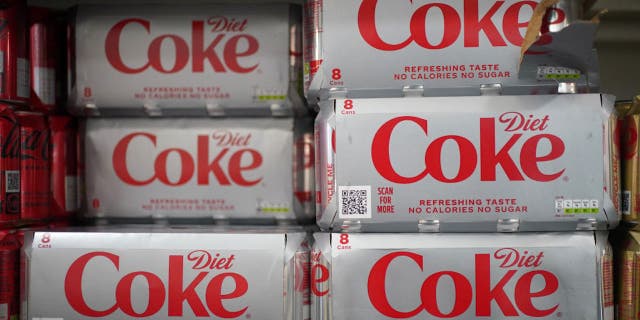The World Health Organization (WHO) released its official statement this week on the potential health risks of aspartame, with a committee classifying the non-sugar, low-calorie sweetener as “possibly carcinogenic to humans.”
Many industry experts, however, are speaking out in defense of aspartame, which is commonly used in diet sodas, chewing gum, some dairy products and many other low-calorie foods and beverages.
The International Agency for Research on Cancer (IARC), a cancer-focused organization within WHO, was the agency that called out the sweetener’s potential cancer risk.
“JECFA also considered the evidence on cancer risk, in animal and human studies, and concluded that the evidence of an association between aspartame consumption and cancer in humans is not convincing,” the press release stated.
The acceptable daily intake (ADI) of aspartame remains 40 milligrams per kilogram of body weight, JECFA also said. That amount is the equivalent of nine cans of 12-ounce diet soda per day for a 150-pound person.
(The FDA recommends an even higher ADI, at 50 milligrams per kilogram of body weight.)
“Our results do not indicate that occasional consumption should pose a risk to most consumers.”
“The FDA disagrees with IARC’s conclusion that these studies support classifying aspartame as a possible carcinogen to humans,” the statement read.
“FDA scientists reviewed the scientific information included in IARC’s review in 2021 when it was first made available and identified significant shortcomings in the studies on which IARC relied.”

Aspartame is commonly used in diet sodas, chewing gum, some dairy products and many other low-calorie foods and beverages. (Getty Images)
“We note that JECFA did not raise safety concerns for aspartame under the current levels of use and did not change the acceptable daily intake (ADI).”
“Aspartame is one of the most studied food additives in the human food supply,” the FDA stated.
“FDA scientists do not have safety concerns when aspartame is used under the approved conditions.”
POPULAR ARTIFICIAL SWEETENER, ERYTHRITOL, COULD RAISE RISK OF HEART ATTACK AND STROKE: STUDY
“It is irresponsible to needlessly scare or confuse people,” he said. “If there was any cause for concern, they would have adjusted the current acceptable daily intake (ADI).”
The Calorie Control Council (CCC) in Atlanta, Georgia, also spoke out in defense of aspartame as a safe food additive.
Any risk is highly unlikely given the JECFA’s guidelines for recommended daily intake, Rankin also said.
“The average 150-pound person would need to consume about 14 12-oz. cans of diet beverages or about 74 packets of aspartame-containing tabletop sweetener every day over the course of their life to raise any safety concern,” Rankin said.
“It is not only wrong, but potentially damaging to certain populations to position IARC’s report alongside true scientific and regulatory agencies like JECFA, the Food and Drug Administration, and the European Food Safety Authority,” Rankin added.
Dr. Ernest Hawk, head of the Division of Cancer Prevention and Population Sciences at The University of Texas MD Anderson Cancer Center, also spoke to Fox News Digital about aspartame’s safety.
“IARC classified aspartame as ‘possibly carcinogenic to humans’ based on limited evidence for cancer in humans and experimental animals, and limited evidence that it might behave as a carcinogen,” he said.
“Because all of the evidence was limited, aspartame was added to WHO’s list of possible carcinogens.”
The list begins with 126 agents known to be carcinogenic in humans (including tobacco and alcohol) and 94 agents that are “probably carcinogenic” — followed by 322 agents that are “possibly carcinogenic,” Hawk explained.
While he believes that the WHO agencies did a careful review and have the public’s best interest in mind, Hawk called for additional research on the long-term health risks of consuming non-sugar sweeteners.
“Sensitivities or allergies to aspartame can result in adverse reactions, and excessive consumption may contribute to weight gain due to heightened cravings for sweet edibles,” she said.
For some people, aspartame may cause physical symptoms that include headaches, dizziness, digestive ailments and allergic responses, Jhaveri noted.
“Avoiding aspartame when possible and opting for natural sugars in fruits and vegetables is prudent,” she said.
For the general public, Hawk recommended “paying attention to the science” as it continues to develop regarding the possible health consequences of artificial sweeteners.
“In the meantime, continue to work on consistently eating a balanced, healthy diet that contains whole foods that are high in nutrient density,” he suggested.
CLICK HERE TO GET THE FOX NEWS APP
CLICK HERE TO SIGN UP FOR OUR HEALTH NEWSLETTER
Aspartame-containing products will include a warning on the label stating “PHENYLKETONURICS: CONTAINS PHENYLALANINE.”
Anyone with PKU should avoid any food or drink with this warning.

